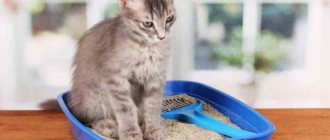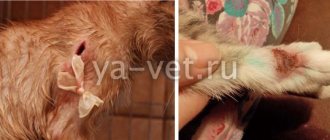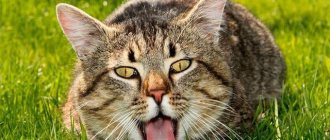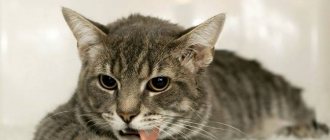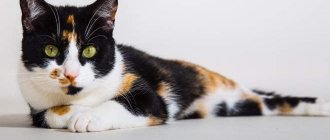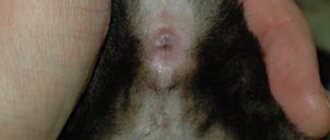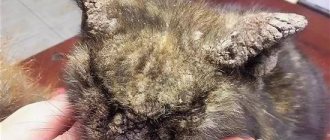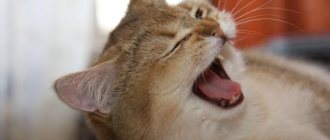If the cat does not go to the toilet regularly, you should pay attention to this and, if the absence of stool lasts for a long time, seek professional help from a veterinary hospital. In accordance with the norm, cats should empty their intestines 1-2 times a day.
If your cat does not go to the toilet for two days, but remains cheerful and feels great, does not scream, does not lose appetite and does not vomit, then it is too early to worry. It is worth giving him Vaseline oil, it should help normalize his stool.
If the cat has not had stool for more than two days, or the absence of stool is accompanied by lethargy, lack of appetite, physical activity, vomiting, or abdominal pain, you should sound the alarm and immediately bring the animal to the veterinarian.
Only in a veterinary hospital will a doctor be able to make an accurate diagnosis and begin to eliminate the problem. Indeed, sometimes the reason for the lack of stool in cats can be serious diseases of the gastrointestinal tract, including intestinal obstruction, which often leads to the death of the animal.
Why is constipation dangerous?
Defecation is a natural process through which the intestines are freed from processed substances. If feces are retained and not released for several days, this leads to severe intoxication of the body.
When a cat is constipated, bacteria that live in the large intestine release toxins, and waste bile contains breakdown products of hemoglobin.
If a cat cannot go to the toilet for a long time, and this happens often, this is bad. This means the pet needs help. After all, systematic constipation can lead to intestinal obstruction and internal bleeding.
First aid for constipation
You can quickly help your cat at home by giving the animal an enema or inserting a rectal suppository into the anus.
Rectal laxatives with glycerin for humans can also be used for cats. Half a candle is placed on the cat. Cut the candle lengthwise, carefully insert it into the anus, hold the pet in your arms, stroking the belly in a circular motion to stimulate peristalsis. Repeat the procedure after 4-5 hours; if there is no bowel movement, administer an enema.
Causes of constipation in cats
If your cat cannot go to the toilet in a big way, it is important to find out the cause of the problem. Constipation is not a disease, but only a symptom that indicates some kind of disorder in the body.
The main causes of constipation in cats:
- The pet drinks little. Due to lack of moisture, stool hardens and moves poorly through the intestines. This often happens when a cat is suddenly switched to dry food.
- Errors in nutrition. Feeding a cat food from the human table can lead to a lack of vitamins and microelements. Because of this, the functioning of various body systems, including the digestive system, is disrupted.
- Stress. A cat may experience constipation after experiencing a fright, a change of owner or place of residence, and a kitten may experience constipation after separation from its mother.
- Worms. Infection with parasites leads to disruption of intestinal function - stool becomes irregular, constipation alternates with diarrhea. In advanced cases, when there are a lot of helminths inside, they interfere with the movement of feces through the intestines.
- Taking diuretics or iron supplements.
- Low mobility. Elderly, pregnant cats, as well as cats with joint diseases have problems with bowel movements because they move little.
- Hairballs. Constipation often occurs due to obstruction of the intestines, as hair clumps accumulate in the intestines.
- Foreign body. If a cat swallows an object, this can also cause constipation.
- Scars in the rectum or anus.
- Distension of the intestines as a result of prolonged constipation.
- Diseases of the paraanal glands in cats.
- After childbirth and abdominal surgery, there are also stool disorders.
Attention! Older cats are more likely to be constipated. It is associated with weakened intestinal motility. In small kittens, this problem occurs due to imperfections in the digestive system.
Chronic diseases that can cause constipation in a cat
Often, constipation is accompanied by diseases that are associated with disturbances in the functioning of the endocrine system:
- diabetes;
- tumors in the rectum or anus;
- kidney pathologies;
- congenital anomalies of the gastrointestinal tract.
Spinal injuries, which damage the nerve roots of the spinal cord, lead to loss of sensation, and the cat cannot poop.
Factors causing the problem
Impaired bowel movements can occur if the following factors are present:
- Acute intestinal obstruction. The problem develops if a foreign body (fur, swallowed paper or cellophane) interferes, and intussusception occurs.
- Neoplasms in the colon. This can cause compression of the intestinal lumen and block the passage of stool.
- Inflammatory pathologies in the intestines.
- Problems with the anus. Due to mechanical damage to the sphincter (for example, scar deformation), defecation may be difficult.
- Disturbed diet. Lack of fiber and water, consumption of dry food can provoke excessive dryness of feces, which impairs its excretion.
Associated symptoms
Constipation does not necessarily mean a complete absence of bowel movements. Some cats have regular bowel movements, but very little feces come out. For this reason, the animal owner may not even be aware of the problem. It is important to find out in time that the cat has stool retention, before his condition worsens.
To understand that your pet needs help, you need to study the symptoms of constipation in a cat:
- the cat does not walk much for 48 hours;
- on palpation, the abdomen is enlarged and painful;
- the cat becomes restless and loses its appetite;
- the pet spends a lot of time in the tray, unsuccessfully trying to poop;
- the cat strains and meows pitifully;
- if the pet still manages to pass a large stool, then very little feces are excreted, it is dry and covered with cracks;
- there is blood in the cat's feces;
- the anus is hyperemic.
Attention! If a cat doesn't poop for more than 4-5 days, it's very bad. With prolonged constipation, signs of intoxication appear - lethargy, vomiting, and sometimes the temperature rises.
Possible reasons for lack of stool
The absence of stool in a kitten for 1-3 days should not cause panic in the owner if the animal’s behavior is otherwise normal.
But it’s worth palpating the abdomen and monitoring what and how the kitten eats.
Small kittens most often suffer from problems with bowel movements (constipation)
The main reasons for the absence of bowel movements in a small kitten:
- Changing the diet and replacing familiar food with a new one , especially if the kitten has just been weaned from the cat. A problem may also arise in a kitten that was picked up from the street: lack of food, consumption of various wastes and a sudden transition to homemade food can cause constipation.
- Unbalanced food with an abundance of meat and fish products or not enough water for the animal to drink. A small body is just beginning to get used to a new diet, so the introduction of new foods should be gradual.
- Worm infestation , most often in kittens picked up from the street. Due to the growth of a ball of worms, the kitten stops pooping.
- Adaptation and stress after moving to new owners can affect the lack of appetite and bowel movements.
- Hairballs that form due to licking can block the path in the intestines for the release of feces, so the kitten must be given a special paste that dissolves the hair.
- Diseases of the gastrointestinal tract, intestinal obstruction, chemostasis, coprostasis.
- Dry concentrated food.
- Large amount of food eaten.
- Foreign bodies entering the stomach, intestines - beads, paper, bones.
- Sedentary lifestyle.
If the kitten has not pooped for more than 3 days, the belly is swollen, and touching it causes pain in the baby, you should immediately consult a veterinarian.
Feces will begin to release toxic substances that will disrupt the functioning of the kidneys and liver, which can lead to death.
Be sure to read:
A cat often burps: causes, symptoms, what to do when vomiting after eating, prevention, what not to do
What to do at home if your cat is constipated
In most cases, it is possible to improve bowel movements with the help of nutritional correction, increased physical activity, massage and laxatives. If fecal retention in a cat is caused by intestinal pathologies or tumor processes, then only surgery will help.
In cases where prolonged constipation is accompanied by vomiting, the cat is given IV drips to prevent dehydration.
Normalization of diet
To help your cat with constipation, you need to change his diet. In the first days after symptoms are detected, it is advisable to switch your pet to liquid food. Food from the human table is completely excluded from the menu - semi-finished products, sweets, foods with added salt and spices, bones.
To loosen stools, you can give a little beef liver daily.
What to include in the diet of a cat with constipation:
- vegetables – pumpkin, spinach, carrots;
- fermented milk products - classic yogurt without additives, kefir, yogurt;
- vegetable oil – no more than 1 teaspoon per day.
It is very important to increase the amount of fluid consumed. The cat should be given purified raw water.
Veterinarians recommend placing several bowls of water in different places in the apartment.
Special feed
Cats that are accustomed to dry industrial formulas are given special food with fiber, vitamins and minerals. They contain plant components, fish oil, and cereals. List of medicinal foods for cats for constipation:
- Royal Canin Fiber Response. Recommended for the treatment and prevention of diseases of the gastrointestinal tract. Duration of use for acute constipation is 1 month, for chronic constipation – up to six months.
- Hills Prescription Diet Feline w/d. Recommended for cats with diabetes, colitis and constipation. Contains a large amount of coarse fibers, which help enhance intestinal motility.
- Eukanuba Renal. Dietary cat food for constipation due to kidney dysfunction. Its difference from others is its low protein and phosphorus content.
Attention! It is very important to feed your cat as recommended by the manufacturer. Do not increase the dosage indicated on the package and do not pour food more than twice a day.
Massage and Vaseline oil
If constipation occurs, you can massage your cat's abdomen and give him Vaseline oil. It is not absorbed in the intestines, but moves along it all the way to the rectum, lubricating its walls and softening the stool.
Vaseline oil helps quite quickly: after 3-4 hours the cat goes to the toilet. The method of application is simple - you need to let the cat drink 1-2 ml from a syringe without a needle. It is advisable to do this in the morning on an empty stomach, then the oil will easily enter the rectum.
Massage helps strengthen intestinal motility. It is done 2-3 times a day for 5 minutes. The cat should not eat an hour before the procedure and 2 hours after it.
Massage technique:
- place the cat on its back on your lap;
- massage the abdominal area clockwise with your fingers.
You can help a kitten in the same way. Although it is usually the mother who massages the babies. She licks their bellies several times a day. This helps kittens go to the toilet regularly.
Laxatives
An easy way to treat constipation in a kitten is to start giving a laxative. It is worth giving preference to safe drugs. The following medications are suitable for cats:
- Duphalac Lactusan. A laxative based on lactulose, which not only softens stool well and promotes its movement, but also improves bowel function. Even a kitten can be given this medicine for constipation; it is absolutely safe.
- Microlax. This is a mini-enema with a solution for rectal administration. The composition contains substances that displace bound water from feces. The drug acts quickly - the urge to have a bowel movement occurs from the first minutes after administration of the solution.
- Normaze. Lactulose-based syrup. Effectively softens stool and promotes easy bowel movements.
Attention! Laxatives can only be given to a cat on the recommendation of a veterinarian. In some cases, their use can harm your pet.
Treatment at the Bio-Vet veterinary clinic
What to do with a cat if he doesn't go to the toilet? Only a veterinarian can decide correctly. If your pet does not feel better after taking Vaseline oil, bring him to our Bio-Vet clinic.
Our highly qualified specialists will help your pets at any stage of the disease. The main thing is, do not delay and do not try to treat the poor animal with folk remedies or advice from the Internet - entrust the life and health of the cat to professionals!
Prices for appointments in our network of veterinary clinics
| Name of veterinary services | Unit | Price, rub |
| ⭐ Initial appointment | 1 animal | 400 |
| ⭐ Repeated appointment | 1 animal | 250 |
| Initial appointment with a specialist | 1 animal | 1100 |
| Consultation without an animal | — | 550 |
| Consultation with a doctor based on test results | 1 PC. | 400 |
| Weighing animals | 1 animal | For free |
| Additional fixation for aggressive animal behavior | 1 animal | 700 |
All our Veterinary Clinics:
For any suggestions regarding the site: [email protected]
|
